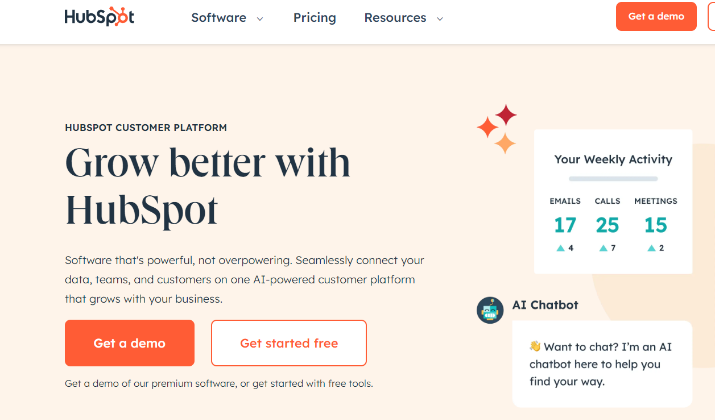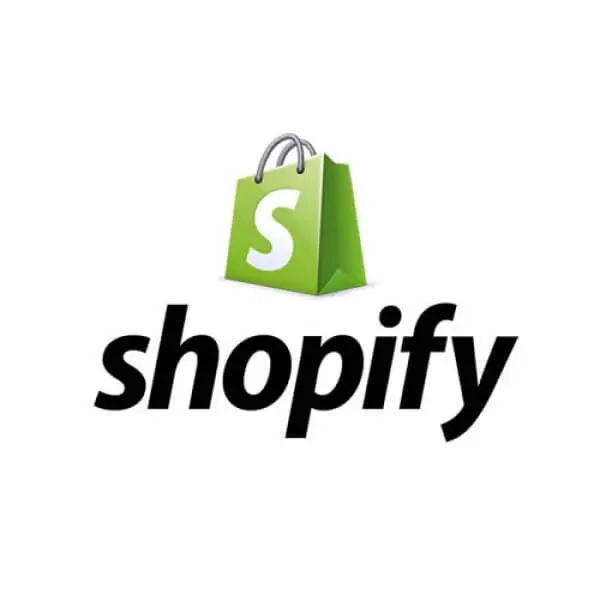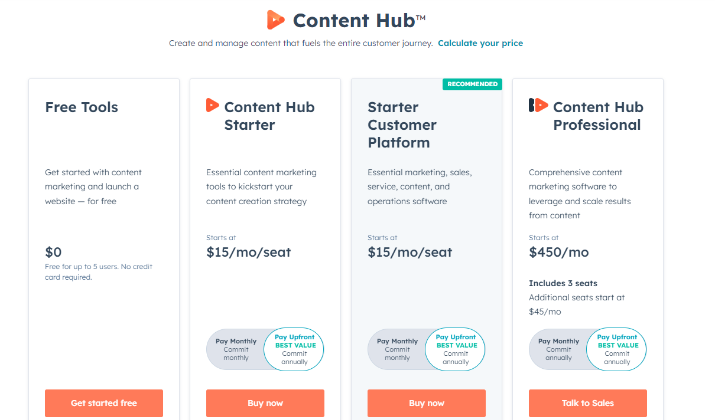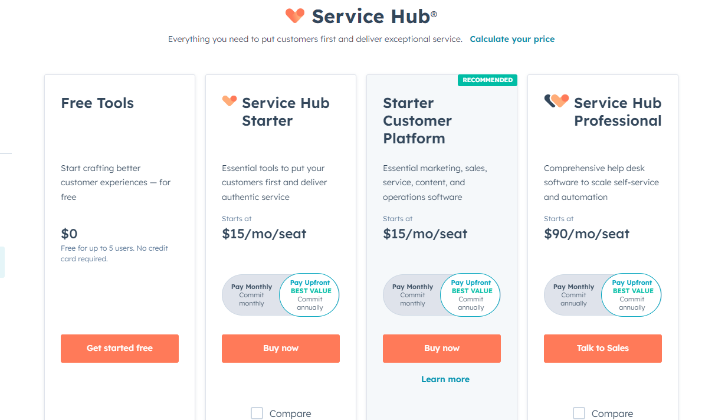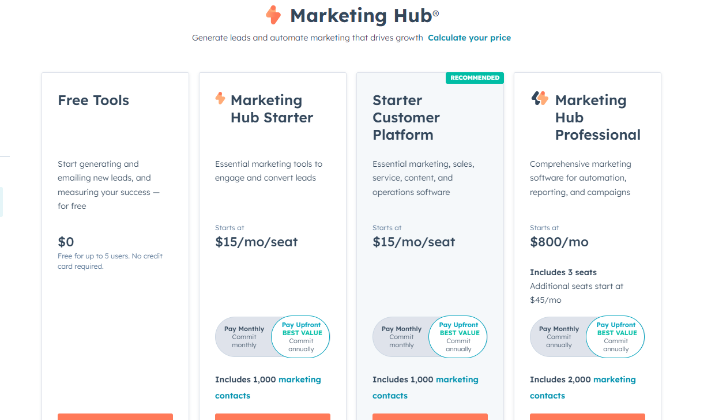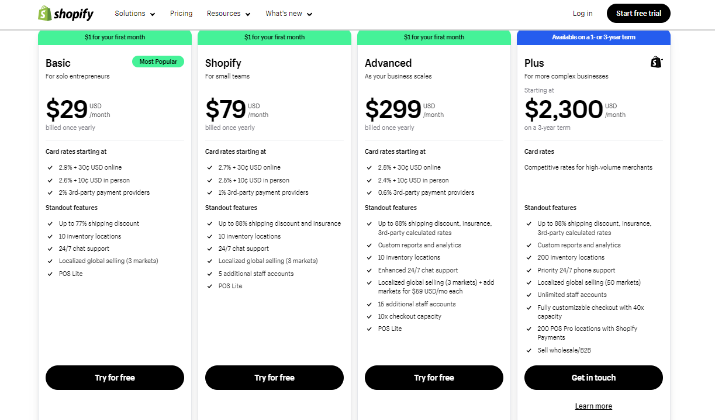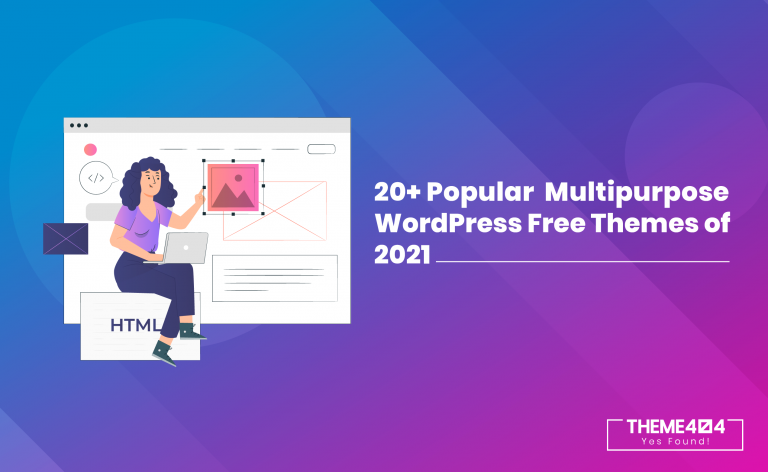HubSpot and Shopify are two of the most popular software platforms used by businesses today.
HubSpot is a comprehensive marketing, sales, and customer service platform, while Shopify is a leading ecommerce platform.
Both offer a range of features and functionalities that will boost your business in different ways.
This article will review their key features, pricing, and other considerations which will help you better understand the two platforms. By the end of it, you’ll know which one to pick.
Let’s begin.
Overview
Hubspot
HubSpot is an all-in-one customer relationship management (CRM) platform that helps businesses attract visitors, convert leads, and close customers.
It offers a suite of integrated tools for marketing, sales, customer service, content management, and operations.
The core of HubSpot is its free CRM, which allows you to organize, track, and nurture leads and customers across the entire buyer’s journey.
The CRM includes features like contact management, deal tracking, and a visual pipeline view.
Built on top of the CRM are five main “hubs”:
- Marketing Hub: Tools for running inbound marketing campaigns, including email, social media, SEO, blogging, and lead generation
- Sales Hub: Features to help sales teams sell more effectively, such as email tracking, meeting scheduling, quotes, and sales automation
- Service Hub: Provides customer service tools like a shared inbox, feedback surveys, and a knowledge base to help delight customers
- CMS Hub: Allows you to build and manage websites and landing pages optimized for growth
- Operations Hub: Helps sync data across systems, clean and validate data, and automate processes to keep operations running smoothly
The hubs work together seamlessly to provide a unified view of the customer and enable teams to deliver a consistent experience.
HubSpot also offers over 1,000 integrations with other popular business tools. It’s a powerful platform for businesses looking to align their marketing, sales, and service teams around the customer and drive growth.
Also read: Shopify vs Jimdo
Shopify
Shopify is a complete ecommerce platform that allows anyone to start, manage, and grow an online business.
It provides a flexible and customizable solution for creating online stores, selling products across multiple channels, and managing all aspects of an ecommerce operation.
The key features of Shopify include:
- Customizable online store themes and templates
- Tools to sell products across various channels, such as social media, physical retail locations, and marketplaces
- Shopify’s own payment gateway to accept credit card payments
- Apps from the Shopify App Store to extend the functionality of your store
- Analytics and reporting to help merchants understand their customers and optimize their business
Merchants can hire Shopify Partners to get professional help with launching, designing, and marketing their stores.
The Shopify admin, accessible via web browser or mobile app, allows merchants to manage all aspects of their business, including orders, products, customers, marketing, and settings.
Overall, Shopify provides a comprehensive and flexible platform for building and managing an online business, with a focus on ease-of-use, customization, and multichannel selling.
Check out: Shopify vs Jimdo
Try Shopify free followed by first month at just $1. No credit card required. Limited Time Offer.
Ease of Use & Implementation
HubSpot is renowned for its intuitive user interface and comprehensive documentation, making it relatively straightforward for users to get started and navigate the platform.
However, HubSpot can be more complex than Shopify, especially for businesses with limited marketing and sales experience.
On the other hand, Shopify is celebrated for its user-friendly design and seamless setup process, making it a popular choice for businesses looking to quickly get their online store up and running.
The Shopify usability and ease of implementation make it an attractive option for businesses that prioritize a simple and streamlined setup.
For businesses with a strong focus on HubSpot usability and the need for a more comprehensive suite of marketing and sales tools, HubSpot may be the better choice.
However, for those seeking a straightforward setup and a quick launch of their ecommerce presence, Shopify’s intuitive platform could be the more suitable option.
Explore: Shopify vs Durable
Marketing & Sales Automation
Both HubSpot and Shopify offer robust marketing and sales automation capabilities to help your online business streamline and optimize its operations.
HubSpot’s marketing hub includes powerful features like email marketing, lead generation, and lead nurturing, while its sales hub provides intuitive tools for managing the sales process, such as deal tracking and pipeline management.
These HubSpot marketing automation and lead generation capabilities can be invaluable for businesses seeking to attract, engage, and convert more customers.
On the other hand, Shopify focuses more on ecommerce-specific sales automation, with features like abandoned cart recovery, upselling, and cross-selling.
These Shopify sales automation features can be particularly useful for businesses that are primarily focused on online sales and ecommerce.
Depending on your business priorities, you will have to decide whether it’s the HubSpot’s automation tools or Shopify’s specialized ecommerce features, that suits your needs.
Read this too: Shopify vs Opencart
Try Shopify free followed by first month at just $1. No credit card required. Limited Time Offer.
Integrations & Customization
When it comes to HubSpot integrations and Shopify integrations, both platforms offer a wide array of options to enhance your business’s capabilities.
HubSpot has a robust ecosystem of over 300 pre-built integrations, allowing you to seamlessly connect your marketing, sales, and customer service data across various third-party tools and applications.
The level of integration can be particularly beneficial for businesses that require a comprehensive and centralized view of their operations.
Similarly, Shopify’s thriving app store provides thousands of third-party apps that can help you customize and enhance your ecommerce capabilities.
From payment processing to inventory management, Shopify integrations can empower you to deliver a tailored customer experience and streamline your online sales workflow.
However, when it comes to customization, HubSpot may offer more flexibility, enabling you to tailor the platform to your specific business needs and preferences.
Whether you prioritize a centralized platform with robust integrations or a specialized ecommerce solution with a wide range of customization options, both HubSpot and Shopify can provide the tools and functionality to support your growth and success.
Also read: Shopify vs Medusa.js
Scalability & Growth
As your business grows, the ability to scale your software platform is crucial.
HubSpot is designed to be highly scalable, with enterprise-level features and the ability to accommodate large teams and complex workflows.
Shopify also offers scalability, with plans that can support businesses of all sizes, from small startups to large enterprises.
However, businesses with more complex requirements or those that anticipate significant growth may find HubSpot’s advanced features and customization options more suitable for their needs.
HubSpot’s scalability allows you to seamlessly manage the increased complexity that comes with business expansion, ensuring your marketing, sales, and customer service operations can keep up with your company’s growth.
On the other hand, Shopify’s scalability is well-suited for businesses that are primarily focused on ecommerce and online sales.
As your Shopify-powered business grows, you can easily upgrade to higher-level plans that provide more storage, bandwidth, and advanced features to support your expanding operations.
When it comes to HubSpot scalability versus Shopify scalability, the choice will depend on the specific needs and goals of your business.
Check out: Gumroad vs Shopify vs Clickfunnels
Try Shopify free followed by first month at just $1. No credit card required. Limited Time Offer.
Pricing
Hubspot
HubSpot offers various pricing plans across its different hubs, including CRM, Marketing, Sales, and Service. Here’s a breakdown of the pricing plans for each hub:
Content Hub
- Content Hub Starter/Starter Customer Platform: With rates starting from $15/month/seat, these plan offer organizations essential content marketing tools to kickstart their content creation strategy.
- Content Hub Professional: The rates of this plan start from $450/month. It is best for medium to large businesses with healthy customer service budgets that want to automate their customer service pipelines and gain important feedback from customer service interactions.
- Content Hub Enterprise: From $1,500 per month, this plan is best for large businesses that want to build excellent digital experiences
Service Hub
- Service Hub Starter/ Starter Customer Platform: The pricing of these plans start from $15/month/seat. It is ideal for businesses keen on enhancing customer experience and delivering authentic services. The tools help automate customer service pipelines and gain important feedback from customer service interactions.
- Service Hub Professional: With prices starting from $90/month/seat, this plan provides comprehensive help desk software to scale self-service and automation for organizations.
- Service Hub Enterprise: The pricing for this plan starts from $130/month/seat. It offers powerful help desk software for advanced control and flexibility of organizational CRM processes.
Marketing Hub
- Marketing Hub Starter/Starter Customer Platform: With prices starting from $15 per month per seat, these plans are best for new or small businesses that are just starting to develop a CRM for their marketing department.
- Marketing Hub Professional: The price of this plan starts from $800 per month. It is ideal for businesses that want to customize personal experiences and use their website to expand their content strategy.
- Marketing Hub Enterprise: With pricing starting from $3,600 per month, this plan has been designed for large businesses that want to build powerful digital experiences.
In addition, Hubspot offers free plans across all these hubs so that users may get started with these tools and evaluate overall efficiency before signing up for paid plans.
Explore: Shopify vs Shoplazza
Shopify
Shopify offers several pricing plans to suit diverse ecommerce needs. These plans include:
- Basic Plan: Priced at $29/month when billed annually or $39/month if billed monthly, This is an ideal plan for new ecommerce businesses. It includes unlimited products, 2 staff accounts, and 24/7 support. Transaction fees in this plan comes to 2.9% + 30¢ online credit card rates and 2.7% in-person rates.
- Shopify Plan: This plan is priced at $79/ month if paid annually or $105/month if billed monthly. It is suitable for growing businesses selling online. It offers 5 staff accounts, professional reports and gift cards. Transaction fees include 2.6% + 30¢ online rates and 2.5% in-person rates.
- Advanced Plan: Priced at $299/month if billed annually or $399/month if paid monthly, this plan is best for scaling businesses needing advanced reports. It comes with 15 staff accounts and third-party calculated shipping rates. Transaction rates include 2.4% + 30¢ online rates and 2.4% in-person rates.
- Shopify Plus: The pricing for this plan starts from $2300 per month. This has been designed for enterprise-level businesses and high-volume merchants.
While Shopify’s more affordable entry-level plans may be appealing for smaller businesses, HubSpot’s comprehensive suite of marketing, sales, and customer service tools can provide better value for money for companies that require a more robust solution.
HubSpot’s advanced features and customization options may justify the higher price point, especially for businesses that anticipate significant growth or have complex requirements.
Read this too: Shopify vs Nopcommerce
Try Shopify free followed by first month at just $1. No credit card required. Limited Time Offer.
Industry-Specific Considerations
When choosing between HubSpot and Shopify, it’s essential to consider the specific needs and requirements of your industry.
HubSpot may be better suited for businesses in industries like software as a service (SaaS), professional services, or business-to-business (B2B), as its comprehensive marketing and sales features can help these companies effectively attract, engage, and retain customers.
Shopify, on the other hand, is particularly well-suited for businesses in the retail, and ecommerce industries, as its ecommerce-focused features and integrations can help these companies manage their online stores and sales processes more efficiently.
For SaaS and B2B companies, HubSpot’s robust marketing automation, lead generation, and customer relationship management (CRM) tools can be invaluable in building and nurturing relationships with your target audience.
HubSpot’s ability to integrate with a wide range of third-party applications also makes it an attractive option for businesses with complex technology stacks.
On the other hand, if your business is primarily focused on ecommerce, Shopify’s user-friendly platform, streamlined checkout process, and seamless integration with popular payment gateways and shipping providers can help you efficiently manage your online store and sales operations.
Shopify’s extensive app ecosystem also offers a wide range of tools and integrations to enhance the functionality and customer experience of your ecommerce business.
Also read: Wix vs Squarespace vs Shopify
Customer Support & Training
When choosing between HubSpot and Shopify, the quality and availability of customer support and training resources can be a crucial factor.
Both platforms offer comprehensive support and educational materials to help users get the most out of their software.
HubSpot is renowned for its responsive and knowledgeable support team, as well as its extensive documentation and training resources.
From in-depth tutorials and webinars to a robust community forum, HubSpot provides a wealth of HubSpot customer support options to ensure users can navigate the platform with confidence.
Similarly, Shopify offers 24/7 Shopify customer support through multiple channels, including email, chat, and phone.
Additionally, Shopify’s training resources, such as online tutorials, training resources, and an active community forum, can help users quickly get up to speed on the platform’s onboarding process and ecommerce features.
Businesses should carefully evaluate the support options and educational materials provided by each platform to ensure they have the resources they need to effectively utilize the software and achieve their goals.
Check out: Ecwid vs WooCommerce
Try Shopify free followed by first month at just $1. No credit card required. Limited Time Offer.
Conclusion
In the HubSpot vs Shopify review, the choice ultimately comes down to your specific business needs and requirements.
If your company requires a comprehensive, integrated solution for marketing, sales, and customer service, HubSpot may be the better fit.
Its robust features and scalability make it an attractive option for businesses that prioritize a robust and customizable platform.
On the other hand, if you’re primarily focused on building a successful ecommerce presence, Shopify could be the more suitable choice.
Its user-friendly design and specialized ecommerce features make it a popular choice for businesses of all sizes, from small startups to large enterprises.

